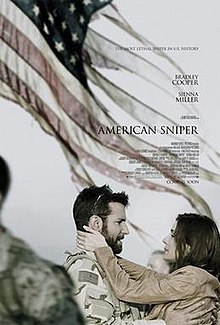
Released: December 25th,
2014
Rated: R
Distributor: Warner Bros.
Starring: Bradley Cooper, Sienna Miller
Directed by: Clint Eastwood
Written by: Jason Hall
Personal Bias Alert: likes war movies, wary of jingoism
7.2 of 10
After
playing in New York City, Los Angeles, and Dallas for three weeks, American Sniper has finally hit theaters
nationwide. I assume this stall was to
avoid competing with Unbroken, whose
success seems only to have revved up anticipation for Sniper. It’s expected to do
boffo business in its opening weekend, breaking the box office record for
January and giving quality-starved movie fans a bit of relief.
Following
the military career of the most lethal sniper in American history, Chris Kyle
(Bradley Cooper), the film could have gone a few different ways. It could’ve been a gritty, realistic portrayal
of modern warfare, a jingoist celebration of a dedicated SEAL, or a character
study of an inevitably haunted man.
Director Clint Eastwood went with a mixture of the former and the
latter, delivering a solid, albeit simple story of a uniquely horrific war and
the toll it took on one of its most successful combatants.
The
movie thrives in the battlefields of Iraq, where Kyle seems the most sure of
himself and, oddly, the most comfortable.
Little time is spent outside of the missions, giving viewers a taste of
how all-encompassing the job must’ve seemed.
The actual war sequences, which range from stationary sniper missions,
home infiltrations, and street-careening Humvee deployments, are well-executed,
ratcheting up the intensity in deceptively different ways without devolving
into character-less set pieces. If Kyle truly
was as obsessed with his duties as this movie portrays, then American Sniper does an excellent job of
establishing why he might’ve felt that way.
Cooper,
who’s been with the project since its inception, is the other big plus
here. He’s clearly very comfortable with
the material and delivers the emotions in a tamped-down way that rings true for
a Navy SEAL. Really, his eyes are the
most striking thing about his performance.
They fade as the movie wears on, losing the twinkle we’ve come to expect
from the lively star. By the end, he’s a
weighed-down man, one who perhaps better understands the impact of his
decisions and makes them more cautiously.
Kyle never was and never becomes a complicated man (he loves his wife,
his country, and Texas), but that doesn’t mean he was lacking in regrets.
Giving
viewers this focused portrait of Kyle was surely difficult, but it doesn’t
excuse the lack of attention given to the rest of the story. Nearly everyone else who appears is a stock
character, with his wife played by Sienna Miller being the only one to get any
extra treatment. Still, she’s nothing
more than Kyle’s wife and mother of his children, and she gets stuck in many of
the clunky PTSD scenes that could’ve been ripped from a TV movie. That’s disappointing, especially after their
meet-cute at a bar was handled so well by both Miller and Cooper.
Really,
everything that takes place outside of Iraq is lazily handled. Plotlines are dropped and never heard from
again, points are made through obvious exposition, and the ending happens far
too fast. This is a film that takes its
time depicting war but rushes everything else.
Yes, there’s time constraints to take into consideration, but there are
a few useless threads (like a bland rival sniper) that could’ve been cut to
make room.
None of these drawbacks
take away from Cooper and Eastwood’s portrait of Kyle, but it certainly holds the
film back from being anything more. No
larger statements on the War on Terror or war in general is made, nor do I
think they were trying to. More
alarmingly, it doesn’t comment much on Kyle himself. The insights that are made are fairly
straightforward, feeling like the kind of mid-level observations you can throw
out about yourself, which in this case almost certainly came from Kyle’s book,
instead of the more honest and sometimes painful connections that only an
outsider can make. There’s many
high-quality elements in American Sniper,
but this lack of depth keeps it from being truly great.
Other Notes:
Ø Several
pieces have been written calling into question the accuracy of this film. This is a rubbish argument, because the film’s
a fictionalized version of events, not a documentary.
Ø As
a warning, this does get rather violent.
Ø It
was kind of distracting that I recognized Jonathan Groff in his scene, but he
did nail it.
Ø Kyle’s
book: American Sniper: The Autobiography of the Most Lethal Sniper
in U.S. Military History

No comments:
Post a Comment